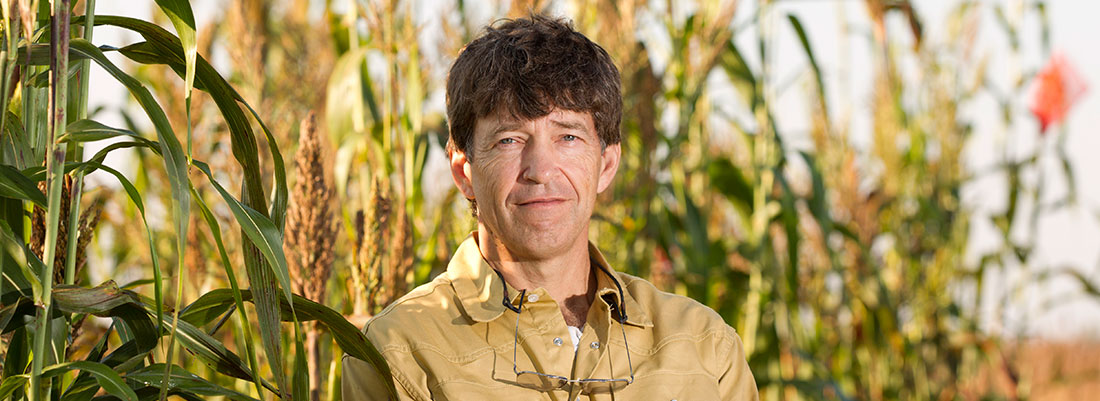The Plant Genome Mapping Laboratory that Regents Professor Andrew Paterson directs addresses dimensions of plant biology relevant toward a more bio-based economy, balancing increased food security with expanded bioenergy supplies while mitigating the challenges of a looming worldwide water crisis.
Where did you earn degrees and what are your current responsibilities at UGA?
My degrees are from the University of Delaware (B.S., summa cum laude) and Cornell University (M.S. in plant breeding and Ph.D. in plant genetics). I head the Plant Genome Mapping Laboratory, a unit that integrates elements of the College of Agricultural and Environmental Sciences and the Franklin College of Arts and Sciences. My faculty appointments are in the departments of crop and soil science in the College of Agricultural and Environmental Sciences and the departments of plant biology and genetics, both of which are in the Franklin College. I am also a member of the university’s Bioenergy Systems Research Institute, its Institute of Bioinformatics and the Plant Center at UGA.
When did you come to UGA and what brought you here?
I came here in 1999 because UGA offered an attractive combination of strengths in fundamental and applied sciences, new facilities and more lab space, and was in a region suitable for growing most of the plants that my laboratory works on, such as cotton, sorghum, sugar cane, Bermuda grass, cabbage, peanut and Miscanthus, a potential source of bioenergy.
What are your favorite courses and why?
I team-teach a course in genome evolution (PBIO/GENE 4510/6510) with my colleague Jim Leebens-Mack in the plant biology department. We combine a few conventional lectures with many intriguing student-led discussions of new findings in genomics research.
What interests you about your field?
I was trained as a conventional plant breeder but have been fortunate to participate in genome sequencing to reveal the entire genetic blueprint(s) of most of the crops that I study. Their unique attributes make crop plants valuable both commercially and as botanical models, thus linking increased fundamental knowledge to improving human lives. Genome sequences empower many new opportunities to improve plants to better suit human needs while also reducing environmental impacts of agriculture. I am excited about pursuing these opportunities. Our planet needs—and genomics may play a major role in—a new “Green Revolution” toward a more bio-based economy, balancing increased food security with expanded bioenergy supplies while mitigating the challenges of a looming worldwide water crisis.
What are some highlights of your career at UGA?
Through the unit that I brought with me to UGA, the Plant Genome Mapping Laboratory, I have been fortunate to work directly with hundreds of gifted and talented people. The unit will soon publish its 300th refereed scientific paper, with our work now cited more than 18,000 times (according to Web of Science). While many valued colleagues are still in the unit, our “graduates” are distributed across the state, the nation and the globe, enhancing our collective impact through their own contributions to research and to training of the generation that will succeed us.
How does your research or scholarship inspire your teaching, and vice versa?
UGA’s motto is “… to teach, to serve, and to inquire into the nature of things.” The last part inspires my contributions to the first two. In only the past decade we have revealed hundreds of millions of years of evolutionary history, making discoveries of both fundamental interest and which can guide applications of importance to humanity. Participation in this era of discovery, and the coming era of its application that I anticipate, inspire my teaching and service.
What do you hope students gain from their classroom experience with you?
A current understanding of genomics, appreciation of the dynamic nature of discovery research and confidence to hold their own in dialogue with research professionals in their field.
Describe your ideal student.
Inquisitive, intelligent, hardworking, reliable and independent.
Favorite place to be/thing to do on campus is…
My lab or our greenhouse or field research plots, working.
Beyond the UGA campus, I like to…
I enjoy various outdoor activities, particularly with my wife, associate professor Maria Navarro, and our sons Paul (soon to be 12) and David (9).
Favorite book/movie (and why)?
Depends what’s on my mind … a sample of recent movies I liked were “The Lorax” and “Skyfall.” And, although more suited to my two sons’ tastes than mine, I want to mention “Escape from Planet Earth” because my brother was the sound editor!
Proudest moment at UGA?
Appointment as a Regents Professor, joining the ranks of only 37 UGA faculty chosen in the past 65 years by their peers for scholarship or creative activity recognized both nationally and internationally as innovative and pacesetting.
(Originally published Oct. 20, 2013)


